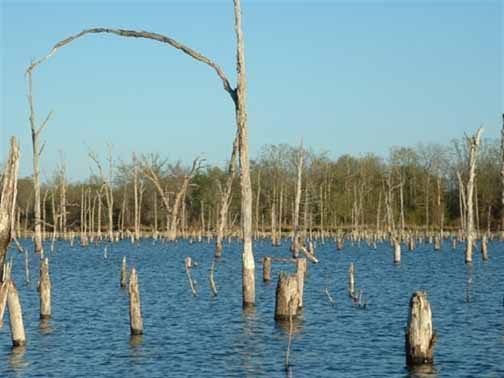by Mario Villarino, DVM, Ph.D.

Lake Fork
It is easy to understand the importance of water as a need and resource for our society. Both extremes (the absence or abundance of water) can provoke catastrophic consequences. Recently (as early as last year) we suffered both sides of the equation in the same year. Although a normal recurrence, the absence or abundance of water can cause stress in farmers and ranchers and communities as well. Both effects can cause detrimental effect in our economy and can cost significant economic toll in county budgets.
But there is another effect, less dramatic but equally important in how we operate our ranches, farms and communities to protect the existing water resources. Based on this, an upcoming water quality training May 6 will focus on Lake Tawakoni, Lake Fork, and area watersheds. A Texas Watershed Steward workshop on water quality and water management related to Lake Tawakoni, Lake Fork, and other area watersheds will be held from 8 a.m.-noon at the Texas A&M AgriLife Extension Service office for Rains County. The office is located at 410 Tawakoni Drive, also known as Highway 276, in Emory. The workshop will be presented by AgriLife Extension and the Texas State Soil and Water Conservation Board. The training is free and open to anyone interested in improving water quality in the region, said program coordinators. Participants are encouraged to preregister at the Texas Watershed Steward website at http://tws.tamu.edu.
The Texas Watershed Steward program is funded through a Clean Water Act nonpoint source grant from the Texas State Soil and Water Conservation Board and U.S. Environmental Protection Agency, said Michael Kuitu, AgriLife Extension program specialist and coordinator for the Texas Watershed Steward program. Kuitu said training will include an overview of water quality and watershed management in Texas, but will primarily focus on area water quality issues, including current and future efforts to help improve and protect local watersheds. “There will be a discussion of watershed systems, as well as the types and sources of water pollution,” he said. “We’ll also have a discussion about ways to improve and protect water quality and the need for community-driven watershed protection and management.”
Attendees of the training will receive a copy of the Texas Watershed Steward Handbook and a certificate of completion. The program offers four continuing education units in soil and water management for certified crop advisers, four units for professional engineers and certified planners, four credits for certified teachers and two credits for nutrient management specialists. A total of four professional development hours are available for professional geoscientists licensed by the Texas Board of Professional Geoscientists. There are also three general continuing education units for Texas Department of Agriculture pesticide license holders, four for certified landscape architects and three for certified floodplain managers. Four continuing education credits are offered for each of the following Texas Commission on Environmental Quality occupational licensees: wastewater system operators, public water system operators, on-site sewage facility installers and landscape irrigators.
Kuitu said he wants to encourage local residents and other stakeholders throughout and beyond Rains, Hopkins, Wood, and Van Zandt counties to attend the workshop to become better informed about area water resources and how to protect and improve their water quality.
For more information, go to http://tws.tamu.edu or contact Kuitu at 979-862-4457, [email protected]; Stephen Gowin in Rains County at 903-473-4580, [email protected]; Mario Villarino in Hopkins County at 903-885-3443, [email protected]; Clint Perkins in Wood County at 903-763-2924, [email protected]; or Tommy Phillips in Van Zandt County at 903-567-4149, [email protected].







